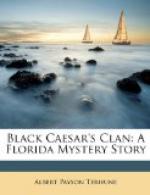“I used to hear great stories about this region years ago,” volunteered Brice as the launch danced over the transparent water past Ragged Keys and bore southward. “I heard them from a chap who used to winter hereabouts. It was he who first interested me in Florida. He says these keys and inlets and changing channels used to be the haunts of Spanish Main pirates.”
“They were,” said Milo. “The pirates knew these waters. The average merchant skipper didn’t. They’d build signal flares on the keys to lure ships onto the rocks, and then loot them. At least that was the everyday (or everynight) amusement of their less venturesome members and their women and children. The more adventurous used to overhaul vessels skirting the coast to and from Cuba and Central America. They’d sally out from their hiding-places among the keys and lie in wait for the merchant-ships. If the prey was weak enough they’d board and ransack her and make her crew walk the plank,—(that’s how Aaron Burr’s beautiful daughter is supposed to have died on her way North, you know,)—and if the ship showed fight or seemed too tough a handful the pirates hit on a surer way of capture. They’d turn tail and run. The merchant ship would give chase, for there were fat rewards out for the capture of the sea rovers, you know. The pirates would head for some strip of water that seemed perfectly navigable. The ship would follow, and would pile up on a sunken reef that the pirates had just steered around.”
“Clever work!”
“They were a thrifty and shrewd crowd those old-time black-flaggers. After they were wiped out the wreckers still reaped their fine harvest by signaling ships onto reefs at night. Their descendants live down among some of the keys still. We call them ‘conchs,’ around here. They’re an illiterate, uncivilized, furtive, eccentric lot. And they pick up some sort of living off wrecked ships and off what cargo washes ashore from the wrecks. A missionary went down there and tried to convert them. He found the ‘conch’ children already had religion enough to pray every night. ‘Lord, send a wreck!’ The conchs gather a lot of plunder every year. They—”
“Do they sell it or claim salvage on it. or—?”
“Not they. That would call for too much brain and education and for mixing with civilization. They wear it, or put it to any crazy use they can think of. For instance fifty sewing-machines were in the cargo of a tramp steamer bound from Charleston to Brazil one winter. She ran ashore a few miles south of here. The conchs got busy with the plunder. The cargo was a veritable godsend to them. They used the sewing machines as anchors for their boats. Another time a box of shoes washed ashore. They were left-hand shoes. all of them. The right-hand box must have landed somewhere else. And a hundred conchs blossomed forth with brand new shoes. They could wear the left shoe. of course, with no special bother. And they slit down the vamp of the shoe they put on the right foot, so their toes could stick out and not be cramped. A good many people think they still lure ships ashore by flares. But the lighthouse service has pretty well put a stop to that.”




